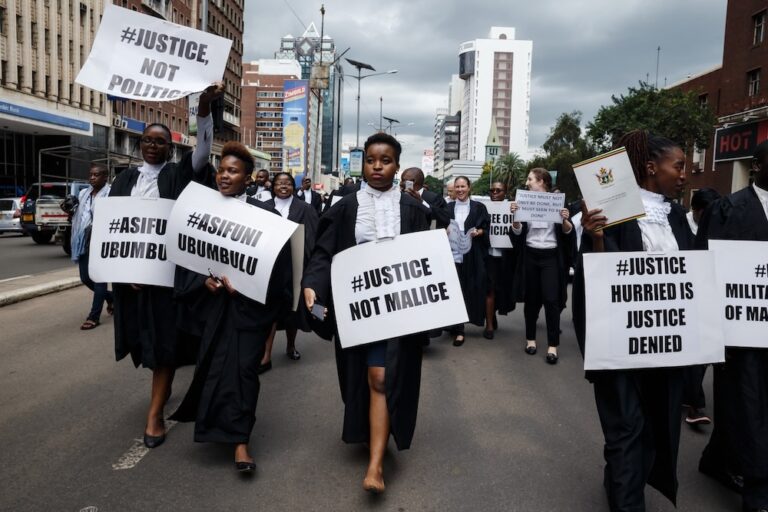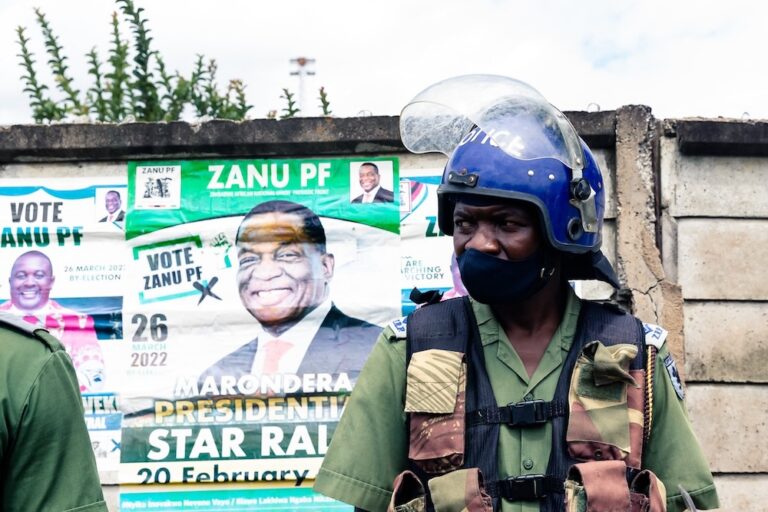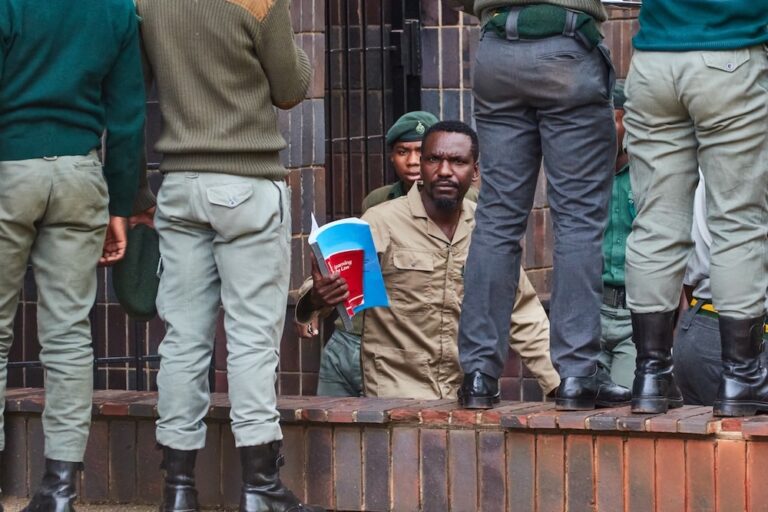(MISA/IFEX) – Three foreign journalists have made an urgent application at the Supreme Court, challenging the constitutionality of certain sections of the Access to Information and Protection of Privacy Act. In papers filed at the Supreme Court, journalists Jan Raath, Andrew Meldrum and Peta Thornycroft ask the court to declare Sections 71 (1), 79 (2), […]
(MISA/IFEX) – Three foreign journalists have made an urgent application at the Supreme Court, challenging the constitutionality of certain sections of the Access to Information and Protection of Privacy Act.
In papers filed at the Supreme Court, journalists Jan Raath, Andrew Meldrum and Peta Thornycroft ask the court to declare Sections 71 (1), 79 (2), 79 (6), 80 and 83 of the act unconstitutional. The journalists argue that these sections contravene Section 20 (1) of the Zimbabwe constitution, which guarantees freedom of expression, receiving and imparting information as a right.
Alternatively, the journalists are asking the court to suspend provisions of Sections 79, 82, 83 and 84 (2) pending the establishment of the Media Commission provided for in Section 20 of the act, or the promulgation of the prescribed qualifications for accreditation to practice as a journalist.
In his application, Raath stated that according to the act only citizens or permanent residents of Zimbabwe will be entitled to be accredited as a matter of right. It will be entirely up to the Media Commission’s discretion to grant or refuse accreditation to journalists who are neither citizens nor permanent residents of Zimbabwe, he argued. “Even journalists who are citizens or permanent residents of Zimbabwe and are qualified are not entitled to accreditation as a matter of right,” read the argument. “The commission has an unfettered discretion as to whether or not to grant accreditation to journalists falling into that category as well,” said Raath in his founding affidavit.
Raath noted that the act contemplates that for an individual to be accredited as a journalist, one must among other things possess the “prescribed qualifications”. However, no such “qualifications” are specified in the act itself. Raath further said that the minister of information and publicity, who is supposed to prescribe such qualifications, had not done so more than a month after the act became law.
Referring to Section 80, Raath argued that the new offence of “abuse of journalistic privilege” created by the act is unnecessary, unreasonable and an undue restriction on the practice of journalism. Raath added that the sections in question infringe his freedom of statement, as enshrined in Section 20 of the constitution, and were inconsistent with freedom of association as guaranteed by Section 20 (1) of the constitution. Meldrum and Thornycroft made similar arguments in their founding affidavits.
Raath is the Zimbabwe correspondent for the Times Group of Newspapers of London, South Press Association, “Newsweek” and Deutsche Presse Agentur. Meldrum writes for the British newspaper the “Guardian”, while Thornycroft writes for the British newspaper “The Daily Telegraph”.
The application cites Minister of State for Information and Publicity Jonathan Moyo as the first respondent and Attorney General Andrew Chigovera as the second respondent.
Background Information
Section 71 (1) states that the Media and Information Commission, whether on its own initiative or upon the investigation of a complaint made by a interested person against the mass media service, [may] suspend or cancel the registration certificate of a mass media service if it has reasonable grounds for believing that: “The registration certificate was issued in error or through fraud or there has been an misrepresentation or non disclosure of a material fact by the mass media owner concerned; or “A mass media service concerned does not publish or go on air within 12 months from the date of registration; or “The mass media service concerned has contravened sections 65, 75 and 89 of the Act”.
Section 79 (2) states that: “Subject to Subsection 4, no journalist shall be accredited who is not a citizen of Zimbabwe or is not regarded as permanently resident in Zimbabwe by virtue of the Immigration Act”.
Section 79 (6) states that: “Every news agency that operates in Zimbabwe, whether domiciled inside in or outside Zimbabwe, shall in respect of its local operations not employ or use the services of any journalist other than an accredited journalist who is a citizen of Zimbabwe, or is regarded as permanently resident in Zimbabwe by virtue of the Immigration Act”.
Section 80 states that: “A journalist shall be deemed to have abused his journalist’s privilege and committed an offence if he falsifies or fabricates information, publishes falsehoods except where he is a freelance journalist, collects and disseminates information on behalf of a person other than the mass media service that employs him without the permission of his employer; contravenes any of the provisions of this Act”.
Section 83 states that: “No person other than an accredited journalist shall practice as a journalist nor be employed as such, or in any manner holding himself out as, or pretend to be a journalist”. It also states that “no person who has ceased to be an accredited journalist as a result of the deletion of his name from the roll or who has been suspended from practicing as a journalist, shall, while his name is so deleted, or he is so suspended, continue to practice directly or indirectly as a journalist whether by himself or in partnership or association with any other person, nor shall he, except with the written consent of the Media and Information Commission, be employed in any capacity what’s so ever connected with the journalistic profession”.


